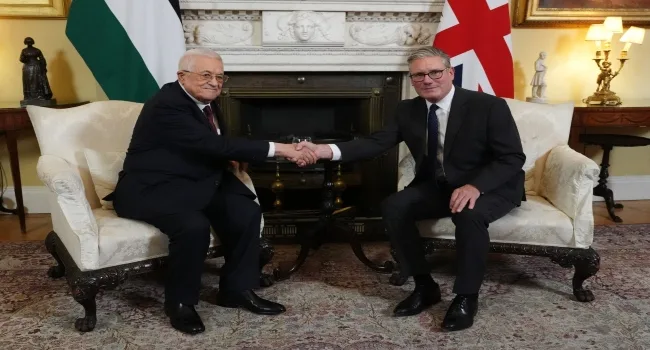In a historic shift in Western foreign policy, Britain, Australia, and Canada officially recognized the State of Palestine on Sunday, triggering swift and sharp condemnation from Israel.
Portugal, too, was expected to announce its recognition later on Sunday, as Israel faces mounting international pressure over its ongoing conflict in Gaza, which was ignited almost two years ago by the October 7, 2023, Hamas attack.
“Today, to revive hope for peace between Palestinians and Israelis, and to advance the goal of a two-state solution, the United Kingdom formally recognises the State of Palestine,” UK Prime Minister Keir Starmer wrote on X.
The UK and Canada have become the first G7 nations to take this step, with France and other countries likely to follow suit at the annual UN General Assembly, which opens in New York on Monday.
“Canada recognises the State of Palestine and offers our partnership in building a peaceful future for both the State of Palestine and the State of Israel,” Canadian Prime Minister Mark Carney posted on X.
This landmark development marks a watershed moment for the Palestinian cause, as the most influential Western countries—long opposed to unilateral recognition—have shifted their stance. For decades, the West has insisted that Palestinian statehood should only be achieved through a negotiated peace agreement with Israel.
However, this move has placed these nations at odds with both the United States and Israel. Israeli Prime Minister Benjamin Netanyahu responded angrily, stating, “Calls for a Palestinian state would endanger our existence and serve as an absurd reward for terrorism.”
As Israel’s Gaza offensive has escalated, aimed at eliminating Hamas militants, a growing number of Israel’s long-time allies have begun to reassess their positions. The Gaza Strip has endured devastating destruction, a rising death toll, and severe food shortages, leading to a major humanitarian crisis and widespread international condemnation.
‘Special burden’ and public pressure
In the UK, government action has been driven by increasing public pressure. Protests calling for a shift in policy have taken place regularly, with a YouGov poll released Friday showing that two-thirds of young Britons (18-25) support Palestinian statehood.
Deputy Prime Minister David Lammy acknowledged at the UN in July that “Britain bears a special burden of responsibility to support the two-state solution.” He noted that over a century ago, the UK played a pivotal role in laying the groundwork for the creation of Israel with the 1917 Balfour Declaration.
Currently, 75% of UN members recognize Palestinian statehood, with over 140 of the 193 member states having taken this step.
In July, Starmer had indicated that his Labour government would recognize Palestine unless Israel took “substantive” steps toward peace, including a ceasefire in Gaza, allowing more humanitarian aid into the region, and ruling out the annexation of the West Bank.
Starmer has also repeatedly called for Hamas to release the hostages taken during the 2023 attack and has signaled that new sanctions could be imposed on the Palestinian militant group.
Calls for hope amid crisis
Lammy told the BBC on Sunday that the Palestinian Authority had been advocating for recognition for some time, seeing it as an essential step toward realizing a two-state solution. However, he acknowledged that recognition alone would not address immediate humanitarian needs, such as providing food or securing the release of hostages.
“Will this feed children? No, that’s down to humanitarian aid. Will this free hostages? That must come from a ceasefire,” Lammy explained. “But it’s an attempt to hold out hope for the two-state solution.”
Palestinian Foreign Minister Varsen Aghabekian Shahin emphasized the importance of the recognition, stating, “It’s not symbolic. It sends a very clear message to Israel that the occupation cannot continue forever.”
Gaza crisis and growing global criticism
The 2023 Hamas attack on southern Israel resulted in the deaths of 1,219 people, most of whom were civilians, according to AFP’s tally. In retaliation, Israel’s ongoing military campaign has killed at least 65,208 people in Gaza, the majority of whom are also civilians, according to Gaza health ministry figures, which the United Nations considers credible.
Portugal’s recognition, which will be formally announced at the UN on Sunday, adds further momentum to the growing movement. “By acting now, we are keeping alive the possibility of achieving a two-state solution,” said Portuguese President Marcelo Rebelo de Sousa.
AFP


